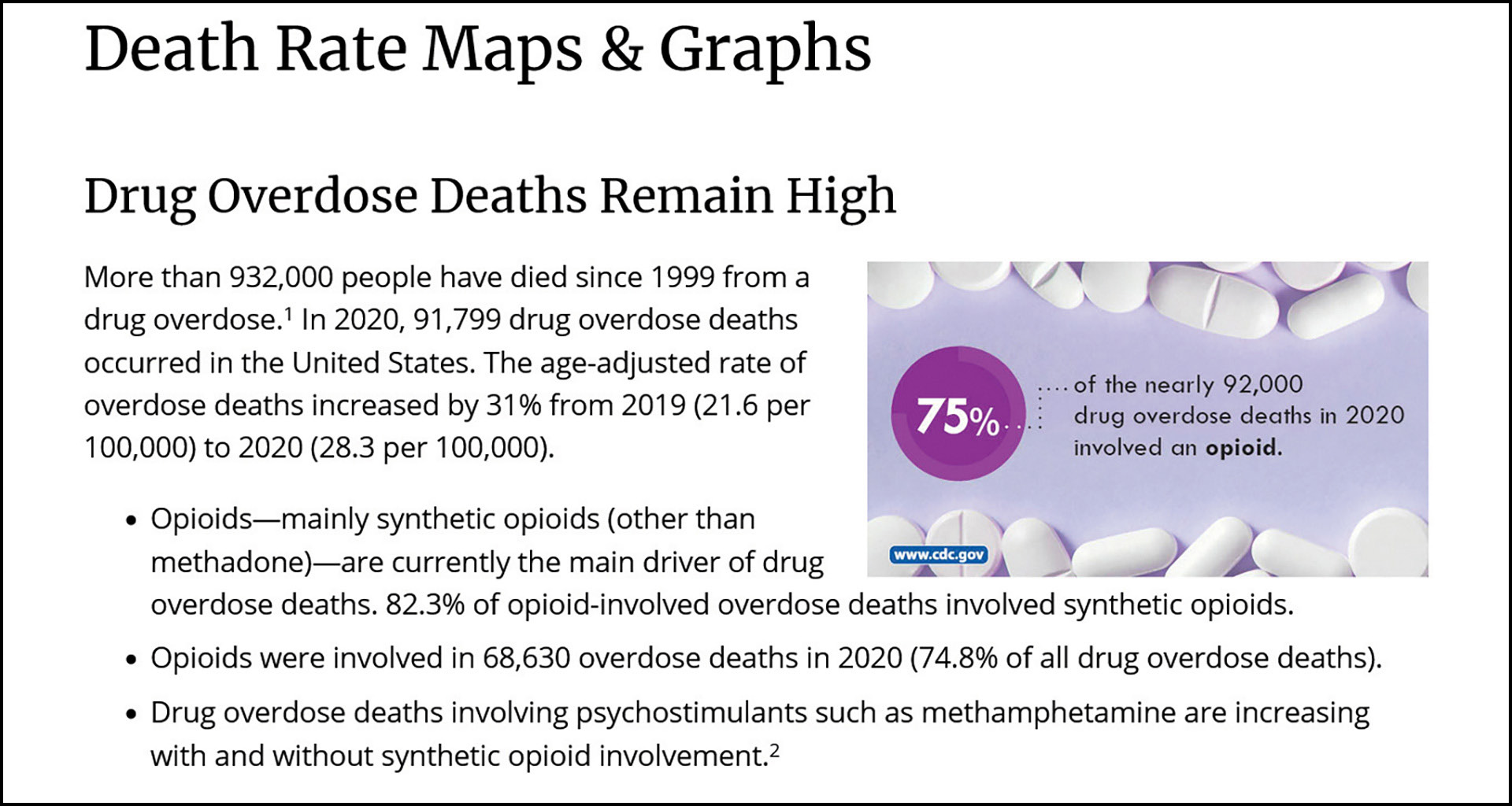[ad_1]

For the past two years, the United States has seen the most overdose deaths in history, with estimations showing over 100,000 overdose deaths occurring in 2020 and 2021. When it seemed like our country overcame the scourge of the pharmaceutical industry flooding patients with opioids, we now sit on the precipice of something far worse: the fentanyl scourge. For us in law enforcement, Narcan deployments evolved from something seldom used by EMS personnel to a common occurrence during a shift, deployed now by responding officers. The opioid epidemic is back — worse than before — and the body count is only rising. The question I ask is, “Are we in law enforcement doing enough?”
That may not be an easy question to answer. Whether you view it as rhetorical or philosophical, the answer is unequivocally “No.” When I teach law enforcement officers across the country, I can see their eyes rolling or heavy exhales when I bring up overdose deaths. You may see political pundits blaming policies from our elected officials as a reason fentanyl is so prevalent, and you may have your own views as to why the statistics are so harrowing. But the metric nobody talks about is that from those approximated 100,000 overdose deaths we saw in our country each of the past two years, how many of those deaths were investigated? After scouring the depths of Google to find a concrete answer, the collective consensus is an average of less than 1%.
Earlier in 2022, four people were charged with the overdose death of actor Michael K. Williams (tinyurl.com/yz6be57u) — a phenomenal case worked by the NYPD in tandem with Homeland Security Investigations.
In April 2022, a man was sentenced for the overdose death of rapper Mac Miller, one of three people originally charged
(tinyurl.com/3z4z2sdk).
In 2019, a former Los Angeles Angels communications director was charged for the overdose death of pitcher Tyler Skaggs
(tinyurl.com/52sxabhm).
To the lay observer, it would seem only when a person of wealth or status perishes from an overdose does law enforcement care. But the truth is, every overdose death can be investigated to the same degree. While federal partners like the DEA, HSI, FBI and FDA-OCI are often involved in cases surrounded by publicity, the reality is that state, local and tribal law enforcement (SLTT) are the ones responding to the overdose calls.
How these calls are handled from the onset is key. Do we view overdose calls as medical calls, or do we view them as crime scenes? Are we looking to clear up, or are we looking for evidence to help further an investigation?
Why do overdose death investigations harbor such a stigma? Perhaps it’s the perception about overdoses or substance abuse in the first place. For us in law enforcement, do we even view those who die from overdoses as “victims?” If somebody is killed by gunfire, regardless of if the homicide victim was involved in some criminal activity, an investigation is launched in full force. A crime scene is secured, evidence is processed … we have shows like The First 48 on A&E that celebrate this process. And yet, when officers respond to an overdose death, why isn’t the same protocol followed?

My first suggestion is that we should be looking for evidence. The most apparent: the deceased’s cell phone. A case that I was personally involved with came from a local detective analyzing an overdose victim’s cell phone, which led to intelligence regarding a local dealer who had purchased the fake Oxycodone pills from a dark web vendor (tinyurl.com/yvs4zc97). Most departments have direct access to phone-analytic tools in-house, but for those that don’t, federal partners like the DEA, HSI and FBI can directly assist in cases involving overdoses.
Since 2016, states across the country have been enacting laws to help assist in overdose liability prosecution (tinyurl.com/5f4ksfzd). However, even if a specific state does not have a de facto liability statute for overdoses, the federal codes can still take precedence. With the Drug Enforcement Administration’s new harm reduction approach to the overdose epidemic (tinyurl.com/jfem5965), federal partners are at the ready to assist in overdose death cases. But in order for there to be any type of involvement from federal partners, the SLTT first responders must be looking into the overdose death in the first place!
Something I feel is the most important and overlooked tool that law enforcement has at its disposal is the ability to talk to people. Whether it’s a friend of the overdose victim, a family member or if the overdose victim is able to be revived, so much actionable intelligence can be gained just from having the compassion to ask questions in the first place.
In New Jersey, we enacted the Overdose Protection & Legal Immunity Act (tinyurl.com/thz38mwt) in 2013, which provides immunity from arrest, prosecution or conviction for use or a simple possession drug charge when a person, in good faith, seeks medical assistance for themselves or for another.
Those who may find themselves in the midst of an overdose need not fear facing criminal charges for the possession and consumption of the narcotic. Quintessentially, these overdose victims or bystanders/partakers can be interviewed with impunity for their actions. Talking to law enforcement may prove to be a cathartic moment for them and help hold those who may have sold them fentanyl-laced drugs accountable.
While I will humbly admit that my expertise lies with cybercrime and the dark web, this begs the question: “How many overdose deaths have a nexus to the dark web?”
The answer: We don’t know.
The reason: We aren’t looking or asking the questions. This is relative to the message I am espousing: We need to do more. Recently, the notorious “Alphabay” administrator DeSnake boasted his “harm reduction” campaign on Alphabay by employing secret shoppers to find fentanyl products (tinyurl.com/mt4mtndv).
I will share with you that in 2018, I lost a very close friend to narcotics, who had purchased drugs off the dark web. The local police that responded did not look into their death beyond chalking it up as another overdose death to add to the statistics. They deserved better. All 100,000-plus overdose victims deserve the same treatment as Michael K. Williams, Mac Miller and Tyler Skaggs. I promise that unless we have the wherewithal to take these cases on, the statistics will get worse before they get better.
[ad_2]





